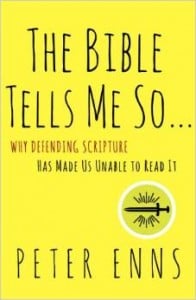We see here Jesus handling Psalm 110* in a very ancient, creative way. We might think he is “misreading” the first line of Psalm 110—and from the point of view of the writer of the psalm he is, since Psalm 110 doesn’t say what Jesus says it says. But in Jesus’s day, such creative handling of the psalm to draw out a deeper meaning is perfectly fine.
What would have turned heads is Jesus’s claim that this psalm has something to say about him: he is David’s descendent and David’s Lord.
On it’s own, and on the surface, the psalm doesn’t say this. But when Jesus gets a hold of it, it does.
Getting on board with Jesus’ interpretations of the Bible can feel like waking up from suspended animation in the year 2525 and onto a whole new landscape—especially if we start out assuming that Jesus reads his Bible like we do. But that’s a bad assumption, and the bottom line for us is twofold.
(1) The way Jesus used the Bible, as unusual as it is for us, was understood and accepted back then. The large crowd that heard Jesus talk about Psalm 110 listened “with delight” as Mark tells us. Jesus’s creative handling of this psalm is at home in first century Judaism.
(2) Jesus tended to focus his interpretation of the Bible on himself personally or what he was teaching. Drawing attention to himself as David’s “lord” was not at home in first century Judaism.
Christian readers today, who expect Jesus to read the Bible the way they do, have a lot of trouble getting on board with #1. But #2 is what got him into trouble with some influential Jewish authorities of his day.
That’s Jesus for you. Making people across time upset with him.
[*Psalm 110 begins The Lord says to my lord, “Sit at my right hand, until I make your enemies your footstool.” In its ancient Israelite context, the psalmist is speaking the first part and simply announcing what God is saying to his (the psalmist’s) king, either David or a king in David’s line, hence: The Lord (God) says to my lord (David/descendent) followed by what God says to this king (the quoted portion). But Jesus reads the psalm differently. He takes the beginning of the psalm as coming from David himself (not the psalmist writing about David). So now you have David referring to one of his descendants as “my lord,” and so Psalm 110 in Jesus’s hands becomes a prooftext “prediction” about Jesus.]
The Bible Tells Me So: Why Defending Scripture Has Made Us Unable to Read It, pp. 176-77











